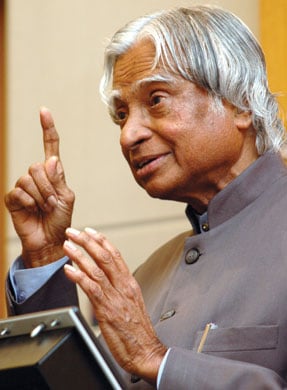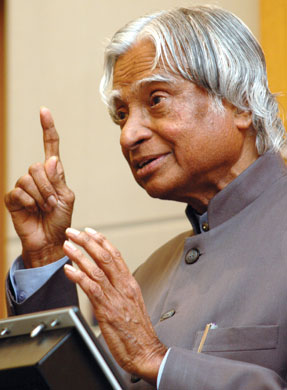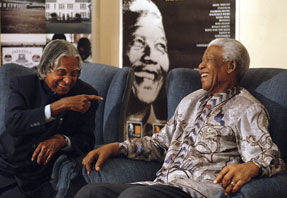Magazine
Abdul Kalam on Competition and Dependence

| Former Indian President A.P.J. Abdul Kalam is popularly known as the “Missile Man of India” for his contributions to the development of “Agni” and “Prithvi” strategic ballistic missiles and he was a major force behind the country’s Pokharan II nuclear tests. The youngest child of a Muslim boatman and best selling author of eight books, including his autobiography, Wings of Fire, Kalam is renowned for his simple, almost austere lifestyle. Pres. Kalam sat down for an interview with Little India during a recent visit to the University of Washington’s South Asian Center in Seattle.
Q: Dr. Kalam, you say the nation comes before the individual. What is your take on American business owners who have outsourced the jobs of their countrymen?
A: Every nation has to follow a certain policy: Commercial, trade, various other types of policies. The phenomenon of globalization is going on. If you consider the law of development, there are two types of nations. One category holds the developed nations, numbering less than 10, and the second category holds the hundreds of developing nations. Developed nations produce and market products in their own country and throughout the world. Only then can they survive as developed nations. Developing nations want to become developed nations. So, they have to produce products and competitively market them globally. So what is the commonality in the picture? Competitiveness! That is a key concept. Cost, quality, marketing — all make up factors of competitiveness. So, all nations have to work competitively, all nations have to depend on each other, work together. There’s nothing wrong in it. Q: How do you envision the epic communal divide between Muslims and Hindus bridged in India? A: Let me tell you a story. The Europeans fought with each other for hundreds of years. They even created two world wars. But today, we see that these same 23 nations have created the European Union. There are rich, not so rich, and poor nations in the EU, and all of them are working towards making Europeans live prosperous, happy lives. So, in India also such changes will happen, in fact throughout the whole world — the earlier the better. To give another example, U.S.A. and U.S.S.R., during the Cold War, generated 10,000 nuclear warheads. Today they are friends. They are saying they are working for world peace, they say they will bring down the number of nuclear warheads. So, historically, this cycle has to come to India too. Good things will happen. Q: You’ve been called the “Missile Man of India” and the “People’s President.” Is there an incongruity between your desire to empower the world with peace and making India a nuclear power? A: I am innocent to the whole affair! I did not call myself these names! (laughs). When a nation is surrounded by weaponized nations, she has to equip herself. That’s what India has done. To make the nation peaceful and prosperous, we need minimum security. That’s what we have done. Q: What was your immediate reaction when “Agni” and “Prithvi” missiles were successful? A: I was right there and witnessed the whole thing. Courage is key. My message, especially to young people is to have courage to think differently, courage to invent, to travel the unexplored path, courage to discover the impossible and to conquer the problems and succeed. These are great qualities that they must work towards. This is my message to the young people. Q: And who taught you this message? A: Myself. I had to learn this myself. Literature also influenced me deeply. In India, we have a famous book called, Thirukkul, written 2,200 years back. I’ll quote a couplet: “If your thoughts are high, definitely you’re going to work for your aim, definitely you will succeed. But conversely, if you don’t have an aim, don’t have high thoughts, how can you aim at success?” My second favorite book is Light From Many Lamps, by (Lillian Eichler) Watson. And the third book that I love is Empire of the Mind. These three books have made my life. Q: How did you feel when you realized that you didn’t have to support your family with your newspaper route anymore?
A: I was the youngest member of my family, a student when World War II broke out. We were under the British rule at that time and the country was going through some tough times. But after the war ended, I didn’t have to sell newspapers anymore and life returned to normal again. Q: How come you’re such a transparently sincere person? A: See, I firmly believe that the nation has to be bigger than the individual and the individual has to work for the nation. If you’re working for yourself, you’ll not be transparent. But once you put the nation above you, you become transparent.
|



You must be logged in to post a comment Login